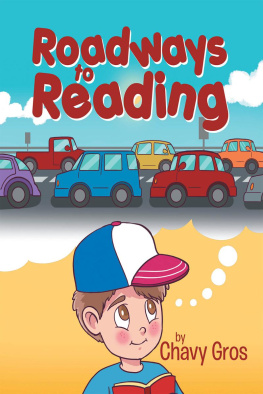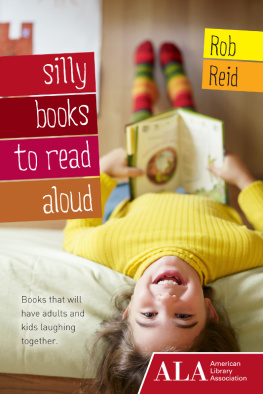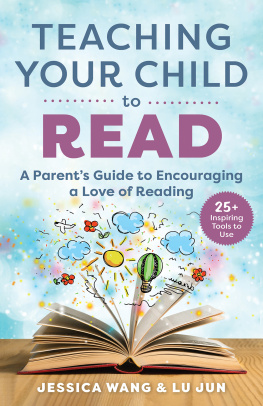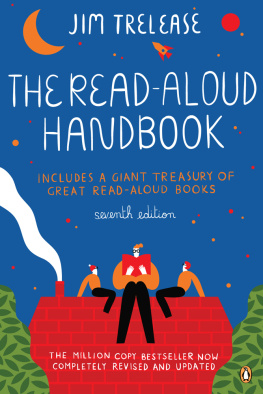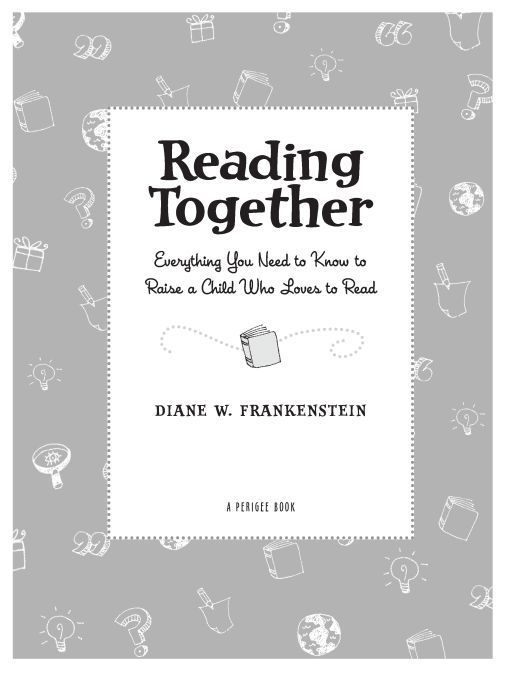Table of Contents
PRAISE FOR Reading Together
Wonderful! Diane Frankensteins book is a priceless gift to parents, teachers, and anyone who cares about children. Filled with wisdom, humor, helpful ideasand most of all, the pure joy and passion for booksthis volume is an absolute treasure. It is a great resource for everyone who loves children and books.
T. A. Barron, author of The Lost Years of Merlin
Diane Frankenstein has written an exceptional practical guide to exploring and expanding on childrens literature that will help anyone who reads with children to extend the experience and help them make connections between their thoughts and what they read. Also, by enriching young readers current experiences, it can encourage them to become lifelong readers drawn to the enduring power of the written word to help them understand and articulate thoughts about life as they experience it.
Marie Conti, Senior Director of School Accreditation and
Member Programs for the American Montessori Society
In Reading Together, Frankensteins enthusiasm for igniting childrens love of reading is infectious. Her strategies are practical and actionable, and her book recommendations are a wonderful resource.
Jeff Wetzler, Senior Vice President of Teacher Preparation, Support,
and Development, and Chief Learning Officer of Teach for America
In Reading Together, Diane Frankenstein provides a delightful springboard for conversations between adults and children about literature. The author distills a lifetime of reading and teaching childrens literature into an accessible guidebook that will be useful in the library and the classroom and, most important, at home. Original and imaginative, the book is a wonderful resource for parents and educators who are interested in generatingand sustaininga love of reading in young people.
Coreen R. Hester, Head of School at the American School in London
A must-have parenting tool! Dianes exceptional knowledge and experience in childrens literature can finally be shared with the world. Parents and teachers from any culture will learn how to ignite a passion for reading in their children with this book. Offering over one hundred quality book recommendations, complete with related questions, this book will show you how to talk with children about books and the world we live in. Dianes reading tips and conversation starters can be used with any book, in any language!
Yolanda Yeh, Pro-Active Learning in Hong Kong
The subtitle of this book, Everything You Need to Know to Raise a Child Who Loves to Read, may sound audacious, but its actually overly modest. Parents and educators who use this book will be raising children who love to learn. Diane Frankenstein teaches us that, through books, children learn languageoral and writtenand through language, they learn to think. Importantly, she shows us that the most important outcome may not just be how many books children have read, but how many conversations theyve had about them.
Milton Chen, PhD, Executive Director of the George Lucas Educational Foundation
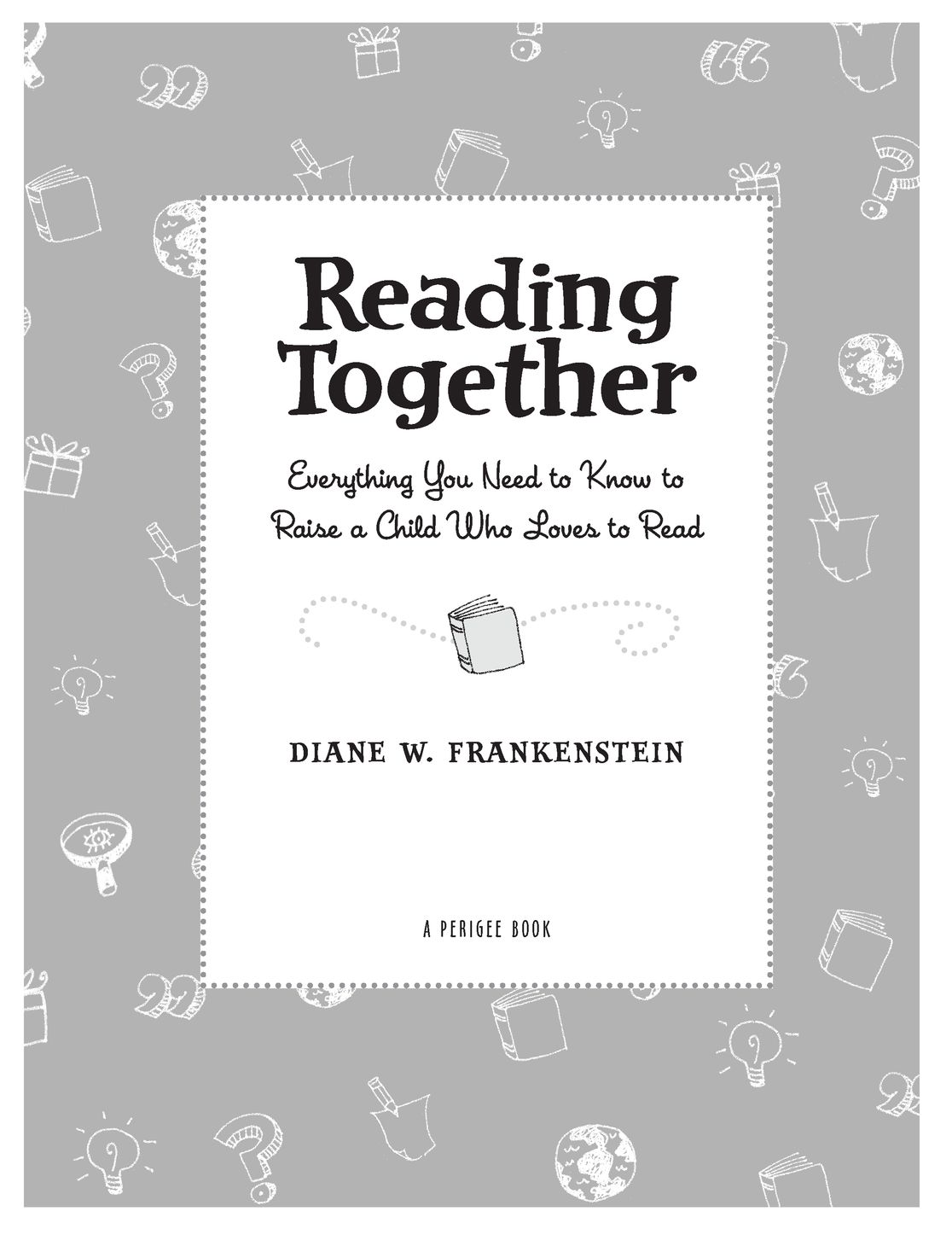

STORIES ARE ONE OF THE WAYS children try the world on for size. They help children find their place in the world. The best of stories show children who they are and as importantly, who they might become. Reading Together is dedicated to all children because, as the English poet Walter de le Mare described, only the rarest kind of best in anything can be good enough for the young. This book is also dedicated to my sons, Daniel and Toby, my first audiencetogether we discovered a cache of stories. Early on I learned that we become the stories we read and the stories we tell and I saw how books truly make a difference in the life of a child. Even today, although my sons are now all grown up, I find myself quoting from some of their favorite childrens books of not so long ago. No one becomes too old for The Little Engine That Could or Mike Mulligan and His Steam Shovel, and children never outgrow the need for a little bit of humor, a little bit of encouragement, or a little bit of praise.
Introduction
Whats life after all? The future isnt here yet and you cannot foresee what it will bring. The present is only a moment and the past is one long story. Those who dont tell stories and dont hear stories live only for that moment and that isnt enough.
ISAAC BASHEVIS SINGER, RECIPIENT, NOBEL PRIZE IN LITERATURE
Why I Read
The perennial child in me is always asking certain types of questions:
If I could take only one book with me to an island, which book would I take?
If I had to choose to live by the sea or in the mountains, which would I choose?
Is cherry pie really my most favorite pie? What about rhubarb pie?
So it comes as no surprise that I like the questions Why do I like the books I like? and How did I become the reader I am today? My answers are varied and take me from The Arabian Nights, a book I met when I was nine years old, to the advice Merlin gave Arthur in T. H. Whites Once and Future King, to my admiration for the Talmudic tradition of Jewish learning, and last but not least, to the books of William Steig. I chuckle to think about the idiosyncratic path that led me to become the reader I am, and how it led me to discover the equation for getting children to love reading.
As a child I was seduced by the power of storytelling that came from reading Scheherazades stories in The Arabian Nights. In the story, King Shahryar married and then executed each of his wives after a single night of marriage to make sure that his new wife would not stop loving him. Little did he know that when he married Scheherazade, she had a clever plan to save her life. Her nightly stories of Sinbad the Sailor and Ali Baba were so exciting that King Shahryar found himself postponing her execution again and again so he could hear the end of her story. At heart, we are all like King Shahryar, who fell under the spell of Tell me more and Then what happened? The essence of Scheherazade illustrates the transformative power of stories.
My curiosity and love of learning have been sustained by the advice Merlin gave Arthur in T. H. Whites Once and Future King: The best thing for being sad is to learn something. Thats the only thing that never fails. You may grow old and trembling in your anatomies, you may lie awake at night listening to the disorder of your veins, you may miss your only love, you may see the world about you devastated by evil lunatics, or know your honour trampled in the sewers of baser minds. There is only one thing for it thento learn. I cant count the number of times I have conjured up Merlins advice, and it always proves truelearning is a wonderful antidote to lifes doldrums and it keeps me alive to the wonders of the world.
My understanding of how children learn was influenced by Talmudic study, a fundamental element of Jewish education. Talmudic study has as its underlying principle the belief that individuals who study togetherthrough questions and answers and conversationsare engaged in their learning, which makes learning relevant. This is how I came to understand that there is always more power in the questions than in the answers.


